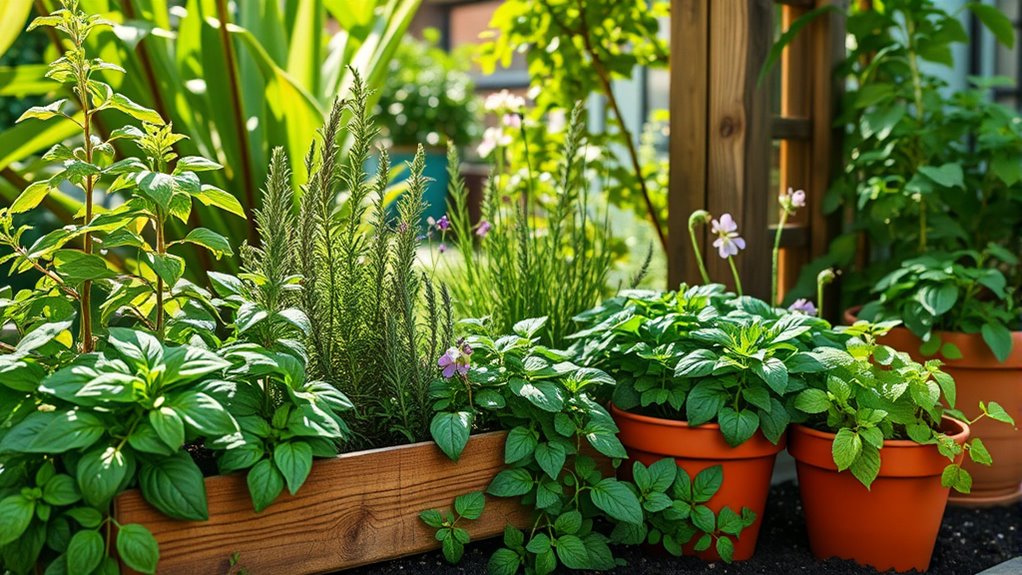Growing my own herbs has been a game-changer for my cooking and health! I love using plants like basil, mint, and rosemary for flavor. For those looking for a detox boost, Kroeger Wormwood Detox Cleanse Capsules are a great addition. If I want to support heart health, I consider the Hawthorn supplement. There are so many options available, and you’ll discover even more helpful tips to start your own flavorful herb garden soon!
Key Takeaways
- Choose herbs like basil, parsley, and cilantro for easy growth and culinary versatility in your home garden.
- Ensure soil quality by conducting tests for nutrient levels and pH to support healthy herb growth.
- Select a sunny location with good drainage to optimize growth conditions for your herbs.
- Utilize organic practices, such as avoiding synthetic pesticides, to maintain a healthy and sustainable herb garden.
- Regularly harvest herbs to encourage new growth and enhance flavor while preventing bolting.
Kroeger Wormwood Detox Cleanse Capsules (100 Count)
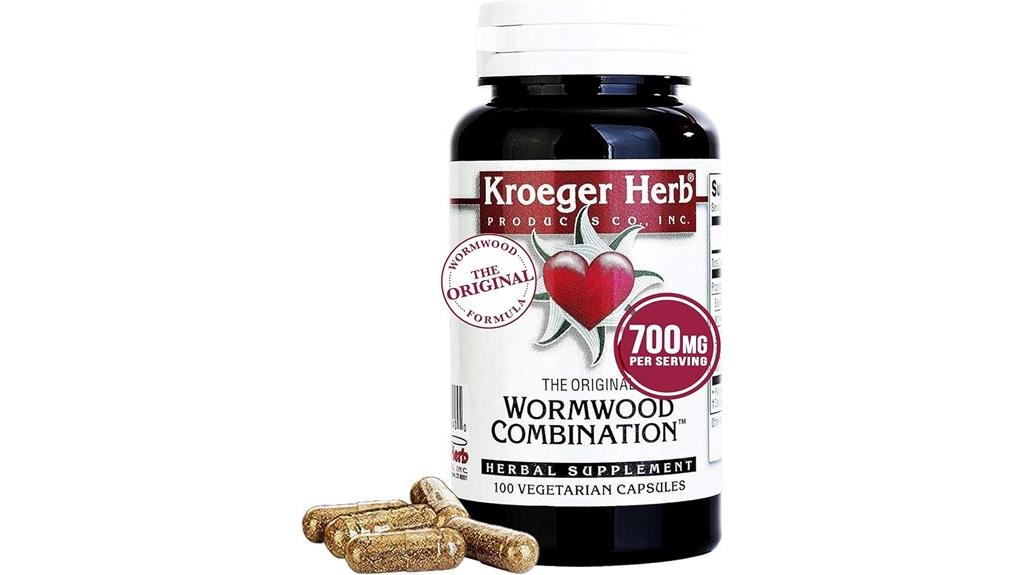
If you’re looking for a natural way to support your liver health and detoxify your body, Kroeger Wormwood Detox Cleanse Capsules could be the perfect choice for you. These vegetarian capsules combine powerful ingredients like Wormwood, Black Walnut, Clove, and Quassia, ensuring you receive potent antioxidants. I’ve noticed improved energy and reduced bloating since I started using them. Plus, they’re non-GMO, gluten-free, and free from preservatives, making them a safe option for many. Users rave about weight loss and enhanced skin, too. Just remember to consult a healthcare provider if you have any pre-existing conditions. Give them a try!
Best For: Individuals seeking a natural supplement to support liver health and promote detoxification.
Pros:
- Contains powerful, natural ingredients like Wormwood, Black Walnut, and Clove, known for their antioxidant properties.
- Non-GMO, gluten-free, and free from preservatives, making it suitable for various dietary preferences.
- Users report benefits such as improved energy, reduced bloating, and enhanced skin appearance.
Cons:
- Caution is advised for individuals with underlying health conditions, as they should consult a healthcare provider before use.
- Some users may experience digestive discomfort or require gradual introduction to monitor tolerance.
- Excessive use could potentially disrupt electrolyte balance; moderation is essential.
Kroeger Herb Circu Flow Hawthorn Supplement for Heart Support (270 Capsules)
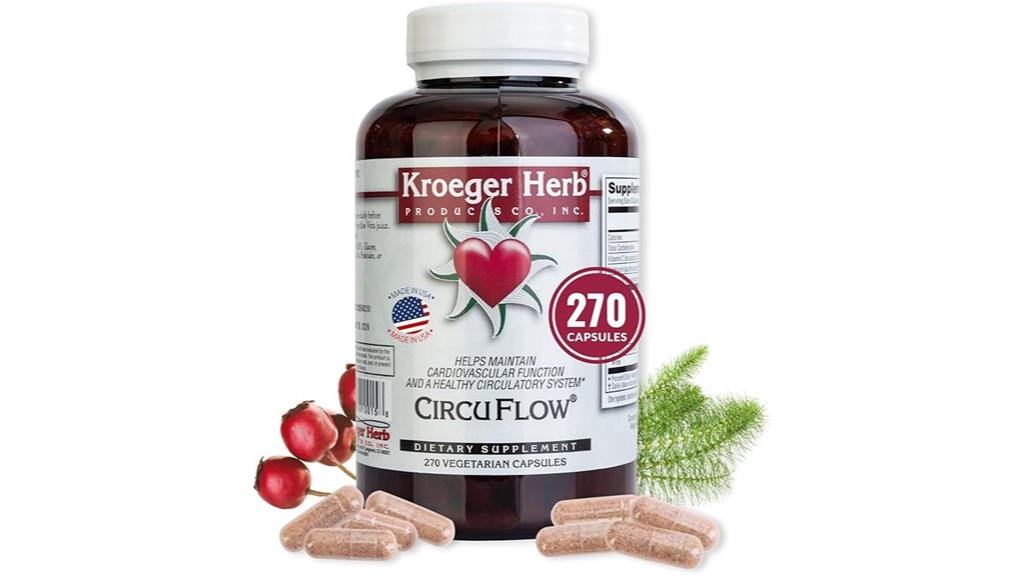
Kroeger Herb Circu Flow Hawthorn Supplement is an excellent choice for anyone seeking natural support for heart health and circulation. With 270 capsules per bottle, this blend features Hawthorn Berry, Horsetail, Chromium, Selenium, Vitamin C, Taurine, and Arginine, all targeted to enhance cardiovascular function. I appreciate that it’s non-GMO, vegetarian, and gluten-free, ensuring a clean formulation. Users rave about improvements in blood pressure and circulation, making this a reliable option for heart support. The recommended dosage is nine capsules daily, ideally taken with aloe juice for better absorption. It’s affordable and effective—perfect for anyone aiming to boost their heart health naturally.
Best For: Those seeking natural support for heart health and improved circulation.
Pros:
- Non-GMO, vegetarian, and gluten-free formulation ensures a clean and safe product.
- Positive user testimonials highlight improvements in blood pressure and circulation.
- Affordable option for daily heart health support with a recommended dosage of nine capsules.
Cons:
- Requires taking a higher number of capsules daily (nine), which may be inconvenient for some users.
- Individual results may vary, and not everyone may experience the same level of improvement.
- Some users may find the taste of aloe juice unappealing when taken with the capsules.
The Chinese Medicinal Herb Farm: A Cultivators Guide to Small-Scale Organic Herb Production

The Chinese Medicinal Herb Farm is an invaluable resource for anyone passionate about cultivating Chinese herbs, particularly for those interested in organic production. This guide offers thorough insights on selection, cultivation, harvesting, and preparation, making it essential whether you’re a novice or experienced grower. I love how it caters to TCM practitioners and plant enthusiasts alike, inspiring many to start their own herb gardens. The colorful photography enhances the learning experience, although I wish it included Chinese characters for broader accessibility. Overall, this book motivates me to dive deeper into the world of Chinese medicinal plants and grow my own flavorful garden.
Best For: This book is best for TCM practitioners, herbalists, and plant enthusiasts interested in cultivating Chinese medicinal herbs organically.
Pros:
- Provides comprehensive information on herb selection, cultivation, harvesting, and preparation.
- Features colorful photography that enhances the learning experience.
- Inspires readers to start their own herb gardens or farms with practical advice.
Cons:
- Some content may be redundant for experienced growers.
- Lacks Chinese characters, which could limit accessibility for Chinese-speaking audiences.
- The second half of the book serves more as a reference, which may not appeal to all readers.
The Big Book of Homemade Products for Skin and Home
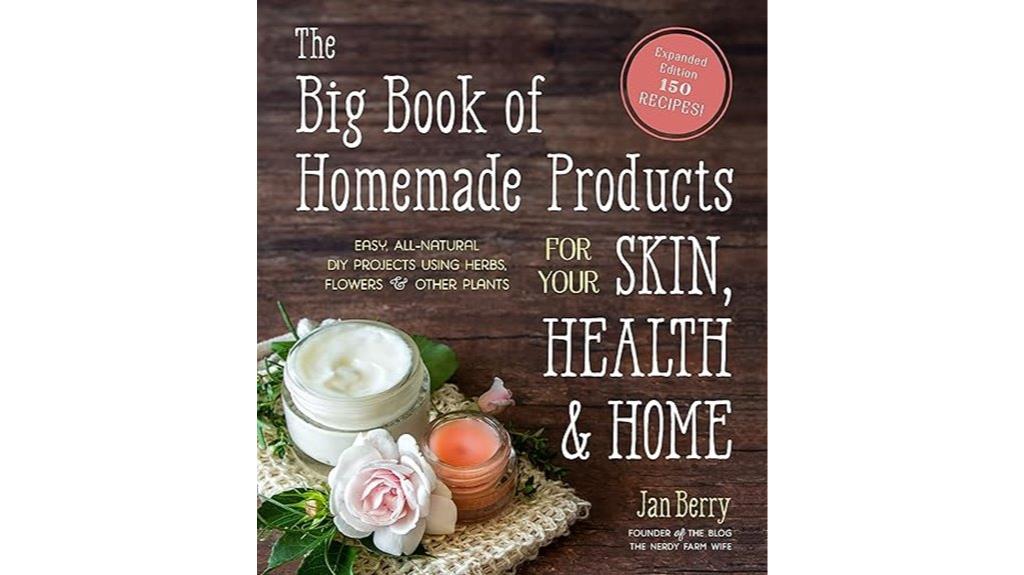
For anyone passionate about natural living, “The Big Book of Homemade Products for Skin and Home” is an indispensable guide. I’ve found it to be a treasure trove of easy DIY projects using herbs and flowers I can grow myself. From facial cleansers to laundry detergents, each recipe is straightforward and rewarding. My favorites include the floral cleansing grains and infused oils, which have noticeably improved my skincare routine. The book also emphasizes safety, providing warnings for ingredients that may not be suitable for children or pets. Overall, it’s a fantastic resource that fosters creativity and community among natural care enthusiasts.
Best For: Individuals interested in natural living and DIY projects for skin care, cleaning, and pet care.
Pros:
- Easy-to-follow recipes make it suitable for both beginners and experienced makers.
- Accessible ingredients can often be grown at home, promoting sustainability.
- Fosters community among users, encouraging shared experiences and knowledge.
Cons:
- Some users report binding issues, which may affect the book’s durability.
- A few recipes may require specific plants or herbs that are not readily available to everyone.
- Safety warnings for certain ingredients may limit options for those with children or pets.
Best Choice Products Elevated 8 Pocket Herb Garden Bed

Looking to grow herbs and vegetables without the hassle of bending down? The Best Choice Products Elevated 8 Pocket Herb Garden Bed is perfect for you! Standing at 32 inches tall, it features eight customizable compartments, making plant identification a breeze. I love its mobility with lockable wheels, allowing me to reposition it for ideal sunlight. Plus, the slatted bottom shelf provides ample storage for my gardening tools. Assembly’s straightforward, though I recommend using a cordless drill to speed things up. While some users noted minor drainage issues, the overall aesthetic and functionality make this planter a fantastic addition to my garden.
Best For: Those looking for an ergonomic and mobile solution to grow herbs and vegetables in compact spaces.
Pros:
- Customizable compartments for easy plant identification and care.
- Lockable wheels for convenient mobility and repositioning for sunlight.
- Ample storage on the slatted bottom shelf for gardening tools and supplies.
Cons:
- Some users reported drainage issues causing water to drip onto the bottom shelf.
- The bottom shelf may require reinforcement over time due to sagging.
- Concerns about the wood stain’s odor and potential toxicity were raised by a few customers.
Kroeger Herb Products Cloves – Natural Antioxidant Supplement (100 Capsules)
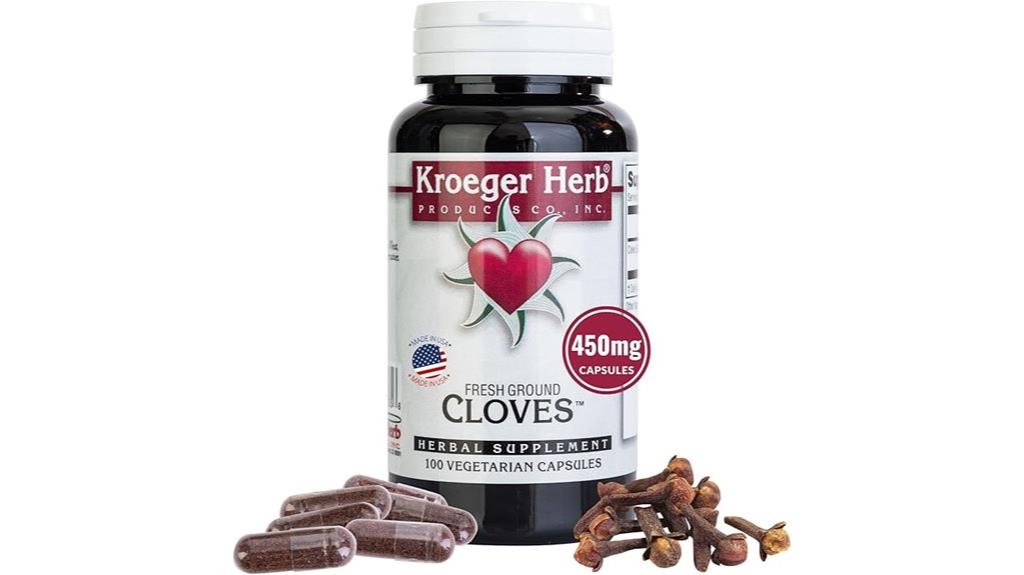
Kroeger Herb Products Cloves stand out as a top choice for anyone seeking a natural antioxidant supplement to enhance their health regimen. These vegetarian, non-GMO capsules support liver health and aid digestion, making them a great addition to my daily routine. Packed with essential nutrients like vitamins C, K, E, and trace minerals, they help maintain pH balance and promote blood circulation. Plus, they’re free from preservatives, fillers, and artificial colors. I’ve noticed positive effects on my digestion and overall well-being. With Kroeger’s commitment to quality since 1978, I trust their cloves for freshness and effectiveness.
Best For: Individuals seeking a natural antioxidant supplement to support liver health and improve digestion.
Pros:
- Vegetarian, non-GMO, and gluten-free formula, making it suitable for various dietary preferences.
- Rich in essential vitamins and minerals, offering multiple health benefits.
- Family-owned company with a long-standing commitment to quality and freshness.
Cons:
- May not be suitable for individuals with specific allergies to cloves or related spices.
- Some users may find the capsule size larger than preferred for easy swallowing.
- Results may vary between individuals, with some experiencing less noticeable effects.
Kroeger Black Radish and Parsley Supplement
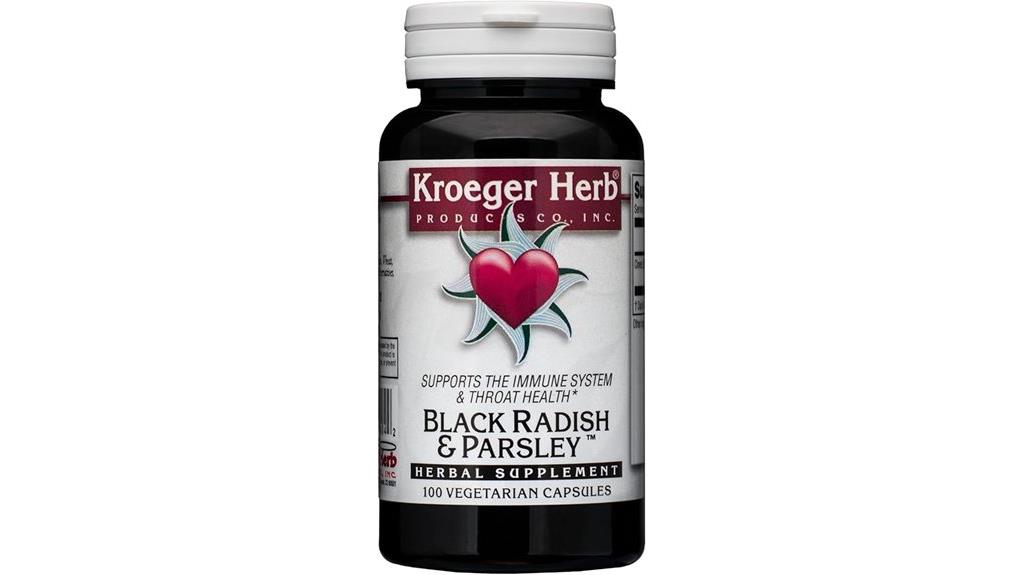
If you’re seeking a natural way to bolster your immune system and support liver health, the Kroeger Black Radish and Parsley Supplement could be just what you need. This supplement combines the detoxifying power of black radish with the antioxidant benefits of parsley. I’ve found it particularly effective in alleviating cold symptoms and boosting my overall wellness. Plus, it’s made from non-GMO, organic ingredients and is free from common allergens, which is a huge plus. While some users wish for clearer ingredient quantities, the positive feedback on its effectiveness speaks volumes. It’s a solid choice for anyone looking to enhance their health naturally.
Best For: Individuals seeking a natural supplement to enhance immune function and support liver health.
Pros:
- Supports immune system health and alleviates cold symptoms.
- Made from non-GMO, organic ingredients and free from common allergens.
- Positive user feedback on effectiveness for digestion and detoxification.
Cons:
- Lack of specific ingredient quantities on the label may raise concerns for some users.
- Some users suggest excluding herbicides to bolster organic credibility.
- Parsley’s diuretic effect may not be desirable for everyone.
Kroeger Turmeric Joint Support & Antioxidant Supplement
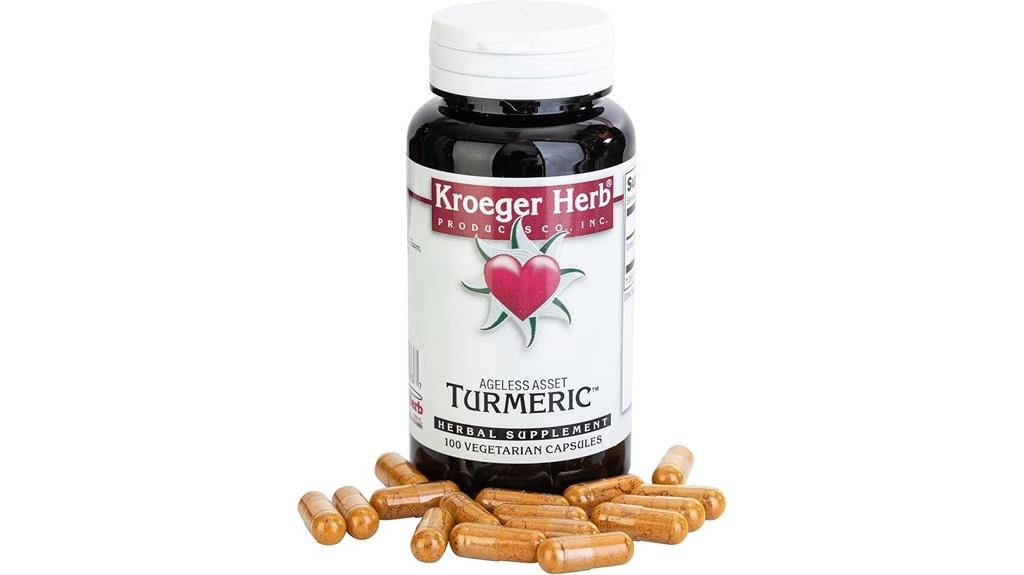
For anyone seeking a natural solution to support joint health, the Kroeger Turmeric Joint Support & Antioxidant Supplement stands out with its powerful formulation. This vegetarian, non-GMO supplement packs 900mg of high-strength turmeric, known for its anti-inflammatory and antioxidant properties. I appreciate that it’s free from preservatives and fillers, making it a safe choice for everyone, even dogs. Users often share their positive experiences, noting benefits beyond pain relief, like weight loss and improved immune function. I recommend taking two capsules in the morning and considering multiple bottles for continued support. It’s truly a gem for joint wellness!
Best For: Those seeking a natural, effective solution for joint health, including individuals and pets.
Pros:
- Vegetarian, non-GMO formula with no preservatives or fillers.
- High-strength turmeric (900mg) offers powerful anti-inflammatory and antioxidant benefits.
- Positive user experiences report additional benefits like weight loss and improved immune function.
Cons:
- Some users may find the suggested dosage of two capsules inconvenient.
- Limited availability in certain regions might require online purchasing.
- Long-term benefits may necessitate purchasing multiple bottles, which could be a consideration for budget-conscious consumers.
Kroeger Herb Products Candida Formula #1 for Gut and Vaginal Health

Looking for a natural solution to support your gut and vaginal health? I’ve found Kroeger Herb Products Candida Formula #1 to be an excellent detoxification supplement. This formula targets candida overgrowth with a blend of herbal ingredients like condurango bark, yellow dock, and red clover. It’s vegan, Non-GMO, and free from common allergens, making it a safe choice for many. I appreciate how it helps cleanse harmful organisms while promoting a healthy balance of intestinal flora. Users report varying experiences, but many have noted relief from symptoms like itching when following the recommended dosage. Give it a try and see how it works for you!
Best For: Individuals seeking a natural supplement to support gut and vaginal health while addressing candida overgrowth.
Pros:
- Non-GMO, vegan, and free from common allergens, making it suitable for a wide range of dietary needs.
- Contains a blend of herbal ingredients that work to cleanse harmful organisms and promote a healthy balance of intestinal flora.
- Many users have reported relief from symptoms like itching when following the recommended dosage.
Cons:
- User experiences vary, with some not noticing significant changes in their symptoms.
- Effectiveness may depend on individual dosage, as some users find lower doses to be sufficient while others may require higher intake.
- As with any supplement, results can take time and consistency may be necessary for optimal effects.
Kroeger Herb Products Sinus Blend for Congestion Relief
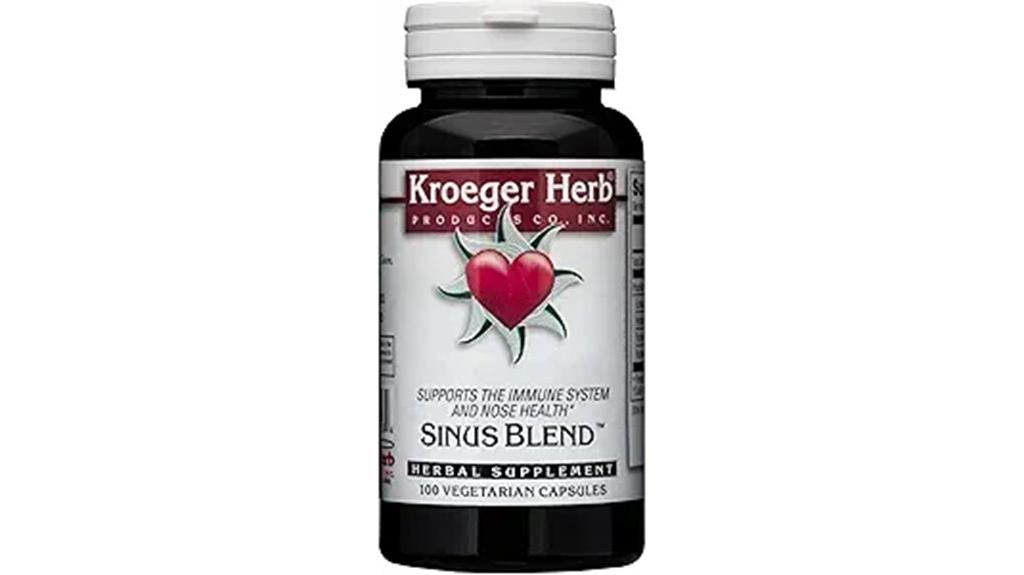
Kroeger Herb Products Sinus Blend is an excellent choice for anyone seeking natural relief from sinus congestion and seasonal allergies. I love how it combines powerful ingredients like horseradish, peppermint, and Vitamin C to help reduce histamine production and promote sinus health. It’s soy-free, vegan, and gluten-free, making it accessible for various dietary needs. I appreciate that it’s non-GMO and preservative-free, crafted by a family-owned company since 1978. Users rave about its effectiveness without the drowsiness typical of conventional antihistamines. For me, it’s become an essential part of managing my allergies year-round, providing noticeable relief when I need it most.
Best For: Individuals seeking natural relief from sinus congestion and seasonal allergies without the side effects of conventional antihistamines.
Pros:
- Non-GMO, preservative-free, and made with powerful natural ingredients.
- Suitable for various dietary needs as it is soy-free, vegan, and gluten-free.
- Users report noticeable relief from sinus issues and improved breathing quality.
Cons:
- Some users may experience bloating as a side effect.
- Effectiveness can vary from person to person.
- May require consistent use for optimal results, which could be a commitment for some.
Kroeger Herb Products Rascal for Gut & Heart Health

If you’re someone who values gut and heart health, Rascal is an excellent choice for your herbal regimen. This product features powerful ingredients like garlic, cayenne, and pumpkin seeds, which work together to support digestion and optimize metabolism. I appreciate that it helps maintain a healthy microbial balance and is effective against parasites, which is especially helpful after travel. Plus, it’s soy-free, vegan, and free from artificial additives, ensuring quality. Just be mindful of timing; some users experience sleep disturbances if taken late in the day. For best results, I recommend using it regularly and pairing it with other herbs.
Best For: Individuals seeking to support their gut and heart health with natural, herbal ingredients.
Pros:
- Promotes balanced gut health and helps maintain a healthy microbial balance.
- Contains high-quality, vegan, and gluten-free ingredients without artificial additives.
- Effective against parasites, making it beneficial after travel or sushi consumption.
Cons:
- Some users report sleep disturbances when taken late in the day.
- Mixed user experiences regarding effectiveness, with some requiring additional herbal combinations for optimal results.
- Requires regular use and potential purchase of multiple bottles for continuous benefits.
Start Your Own Herb and Herbal Products Business
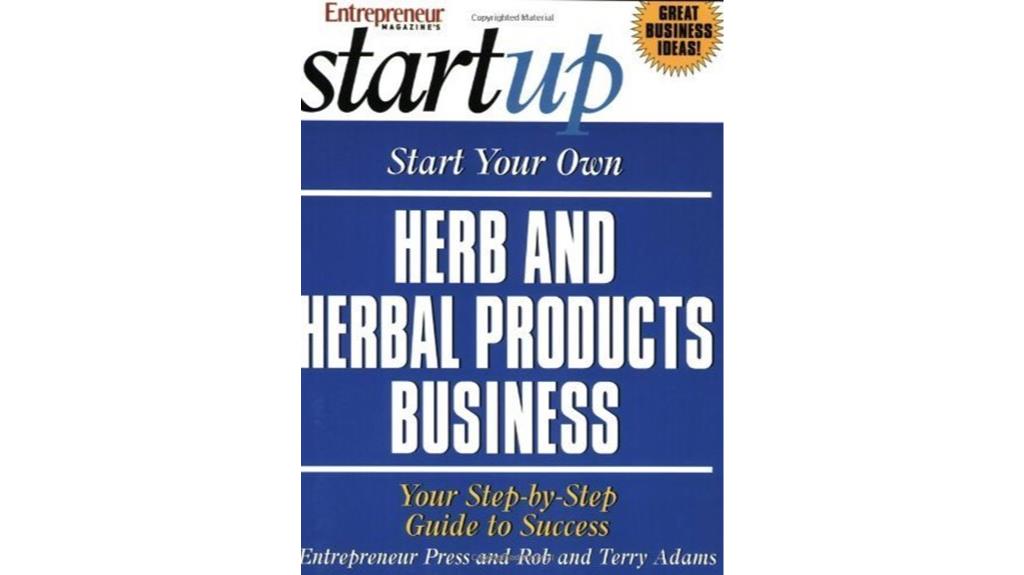
For aspiring entrepreneurs enthusiastic to plunge into the herbal industry, “Best Herbs for Home Production” offers an all-encompassing roadmap to launching your own herb and herbal products business. I found the book engaging and devoured it in just two days. It provides a thorough plan and is a valuable resource for anyone considering this venture. However, I wish it covered a broader range of herb business types. Despite not recalling purchasing it or having a hard copy, I strongly recommend it alongside other resources for a well-rounded business plan. Immerse yourself, and let your herbal journey begin!
Best For: Aspiring entrepreneurs looking to start their own herb and herbal products business.
Pros:
- Provides a thorough and engaging plan for starting an herbal business.
- Quick to read, making it accessible for busy individuals.
- Strong recommendation for those entering the herbal industry.
Cons:
- Simplistic concepts and presentation may not appeal to all readers.
- Limited range of herb business types covered in the book.
- Lack of a hard copy and absence on Kindle may hinder availability for some.
Kroeger Herb Products Lung Formula – 100 Capsules

Looking for a natural way to support your respiratory health? I’ve found that Kroeger Herb Products Lung Formula is an excellent choice. This blend features powerful ingredients like echinacea, garlic, and thyme, all working together to nourish the lungs and promote wellness. It’s especially beneficial for those with sensitivities, urban dwellers, and smokers. I’ve experienced improved lung function and relief from sinus congestion after using it. Plus, it’s Non-GMO, gluten-free, and vegan, ensuring you get quality without any harmful additives. Kroeger’s commitment to purity makes this product a reliable option for anyone seeking respiratory support.
Best For: Individuals seeking natural respiratory support, including smokers, urban dwellers, and those with sensitivities.
Pros:
- Non-GMO, gluten-free, and vegan, catering to various dietary needs.
- Contains a powerful blend of herbal ingredients known for respiratory health benefits.
- Manufactured in the USA with a commitment to purity and quality standards.
Cons:
- Results may vary between users; not everyone may experience significant improvements.
- Requires consistent use for optimal effectiveness, which may not suit all lifestyles.
- Some individuals may be sensitive to certain herbal ingredients included in the formula.
Solo Therapy Patchouli Herb (30 Grams)
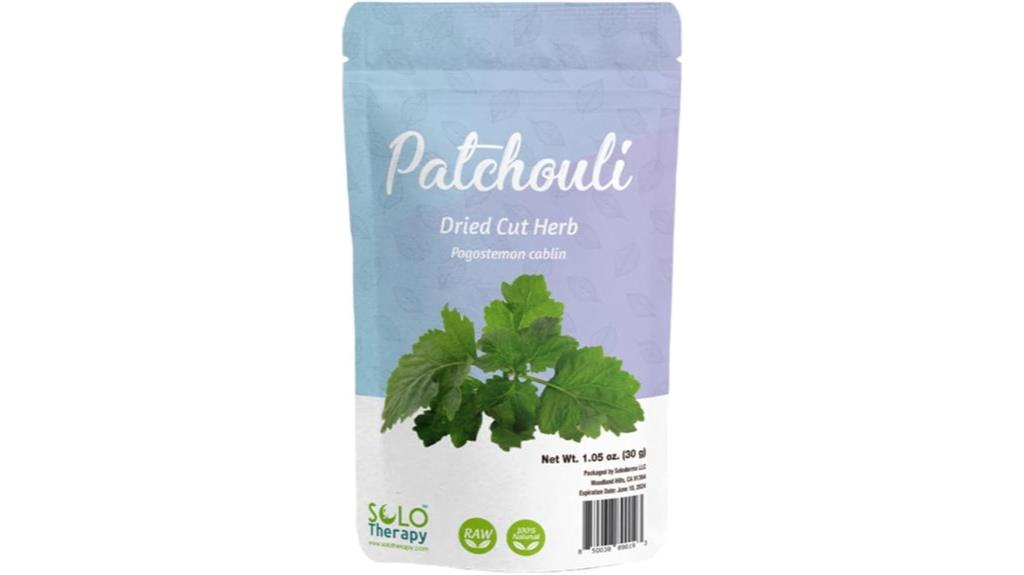
Solo Therapy Patchouli Herb (30 Grams) stands out for anyone seeking to enhance their spiritual practices or aromatherapy routines. This herb, with the botanical name Pogostemon cablin, carries energies of grounding and sensuality. I find it perfect for rituals, meditation, or even love spells when both parties appreciate its rich scent. While the average rating of 4.2 stars reflects a mix of positive and negative feedback, I appreciate the high-quality leaves and strong aroma. At around $11, it’s an affordable addition to my collection. Just be aware of possible quality inconsistencies, and you might discover its unique benefits!
Best For: Those interested in enhancing their spiritual practices, aromatherapy, or love rituals with a grounding and sensual herb.
Pros:
- High-quality leaves with a strong aroma.
- Affordable price point at around $11 for 30 grams.
- Versatile use in rituals, meditation, and Wicca practices.
Cons:
- Reports of quality inconsistencies between batches.
- Some customers received older product with stems included.
- Shipping times may be longer than expected for some buyers.
Kroeger Herb Chem X Daily Detox and Cleansing Formula

Kroeger Herb Chem X Daily Detox and Cleansing Formula stands out as an excellent choice for anyone seeking a gentle yet effective way to support liver function and enhance digestive health. I love how it combines red clover, yellow dock, and paprika to target toxins while promoting digestive wellness. It’s Non-GMO, gluten-free, and free from preservatives, which fits my dietary needs perfectly. I’ve noticed a boost in my energy levels and improved gut health since I started using it. Plus, its high bioavailability guarantees I absorb the nutrients efficiently, making it a staple in my daily routine for detoxification.
Best For: Individuals looking for a gentle yet effective detox solution to support liver function and enhance digestive health.
Pros:
- Non-GMO, gluten-free, and preservative-free, making it suitable for various dietary needs.
- High bioavailability for effective nutrient absorption and enhanced energy levels.
- Formulated with a blend of herbs that promote gut microbiome health and digestive wellness.
Cons:
- May not be suitable for individuals with specific allergies to any of the herbal ingredients.
- Results may vary, and some users may not experience noticeable effects.
- Requires consistent daily use to achieve optimal benefits, which may be inconvenient for some.
Factors to Consider When Choosing Herb Production
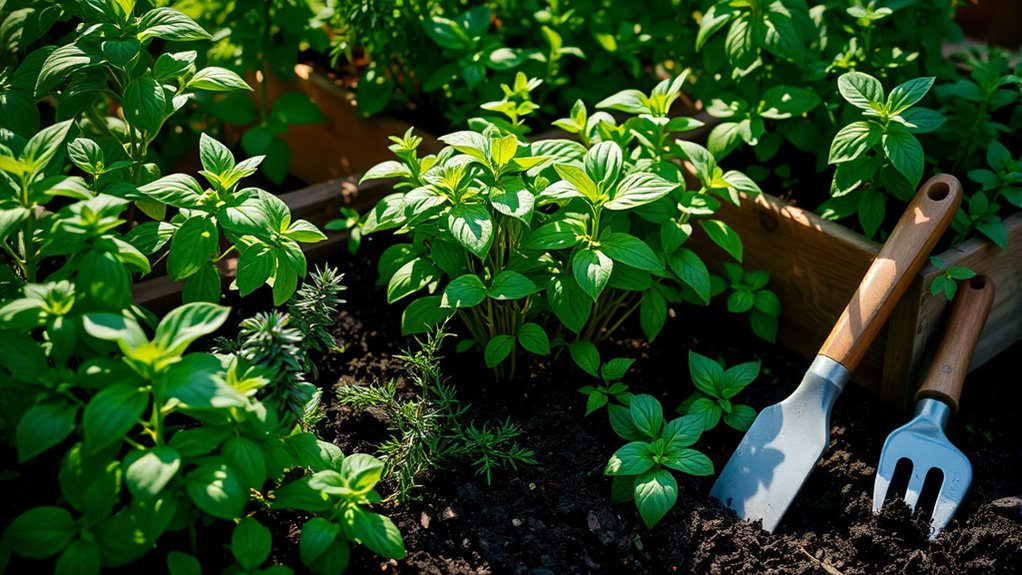
When I choose herbs for home production, I always think about several key factors. Soil quality, climate, and pest management can really impact my success, along with whether I want to go organic or how I select my seeds. Let’s explore these considerations to guarantee a thriving herb garden.
Soil Quality Assessment
Since soil quality plays a significant role in herb production, it’s important to assess several factors before planting. I always start with a soil test; it reveals essential information about nutrient levels, organic matter, and pH. Ideally, I want that pH to be between 6.0 and 7.5 for ideal nutrient uptake. Good drainage is key too, as waterlogged soil can lead to root rot, jeopardizing my herb plants. To improve soil health, I incorporate organic matter like compost or well-rotted manure. This not only enhances soil structure but also boosts moisture retention and provides essential nutrients. By focusing on soil quality, I set my herbs up for success, ensuring I get the best yield and flavor from my garden.
Climate Suitability Analysis
After ensuring my soil is in prime condition, I turn my attention to the climate suitability for herb production. I’ve learned that the right climate greatly impacts growth rate, yield, and quality. Most herbs thrive in temperate climates with defined seasons, ideally at temperatures between 60°F to 75°F. Extreme temperatures can stress plants and diminish their essential oils. I also keep humidity in check; herbs generally prefer moderate levels around 40-60% to promote healthy growth and flavor while preventing disease. Additionally, I always consider soil drainage, as well-drained soils rich in organic matter are vital. Finally, understanding local frost dates helps me plan planting schedules, ensuring my herbs thrive without frost damage.
Pest Management Strategies
Effective pest management is essential for successful herb production, and I’ve found that employing a combination of strategies really makes a difference. Integrated Pest Management (IPM) is my go-to approach, blending biological, cultural, physical, and chemical tools to minimize damage while reducing pesticide reliance. Regular monitoring and identifying pests help me implement timely interventions, keeping populations in check. I love using companion planting, like marigolds alongside my herbs, to naturally repel nematodes and harmful insects. Additionally, maintaining healthy soil through proper fertilization and watering boosts my plants’ resilience against infestations. Ultimately, I use physical barriers like row covers to protect my herbs from insects while still allowing light and moisture to reach them. It’s all about staying proactive!
Organic Certification Requirements
When considering organic certification for herb production, it’s critical to understand the specific requirements set by the USDA. I’ve learned that using organic seeds and avoiding synthetic pesticides and fertilizers are essential. Keeping detailed records of all farming practices, inputs, and sales is necessary to demonstrate compliance during inspections. I also find that practices like crop rotation, cover cropping, and proper soil management are significant for maintaining soil health and biodiversity. It’s important to recognize that achieving organic certification can take several years, as land must be free from prohibited substances for at least three years. To keep my certification, I’ll need to undergo regular inspections and renew it annually, ensuring I stay compliant with organic standards.
Seed Selection Considerations
How do I choose the best seeds for my herb production? First, I consider my local climate and soil conditions, as they play a vital role in growth and quality. I always opt for seeds that are certified organic or non-GMO to support sustainable practices and minimize chemical exposure. Checking the germination rate and seed viability is essential, too; higher rates promise better cultivation success. I also think about the intended use of the herbs—whether for culinary, medicinal, or ornamental purposes—to align with market demands. Finally, I factor in the maturation time; faster-growing varieties can yield quicker returns, allowing me to enjoy multiple harvests within a single growing season.
Irrigation Techniques and Systems
Maintaining ideal moisture levels is essential for successful herb production. I’ve found that proper irrigation techniques play an important role in achieving this. Drip irrigation systems are my go-to choice since they deliver water directly to the roots, reducing waste and minimizing disease risk. To further optimize watering, I use soil moisture sensors to monitor my herbs’ needs, ensuring I only water when necessary, which conserves resources. Additionally, I love employing rainwater harvesting; it’s a sustainable way to utilize nature’s own resources. I’ve learned that the right irrigation method greatly impacts my herbs’ health—overhead watering can lead to fungal issues, while subsurface irrigation encourages deeper root growth, promoting stronger, more flavorful plants.
Harvesting and Processing Methods
To guarantee my herbs reach their full potential, I focus on the timing and methods of harvesting. I typically harvest just before the plants flower, as this is when their potency peaks. I always use clean, sharp tools to minimize damage and preserve quality. After harvesting, I dry the herbs in a cool, dark, and well-ventilated area to protect their essential oils and prevent mold. Prompt post-harvest processing, like grinding or packaging, helps maintain freshness, so I keep light and air exposure to a minimum. I also make sure all equipment and surfaces are sanitized to avoid contamination, which is vital for maintaining the integrity of my precious herbs. These careful practices really make a difference!
Marketing and Distribution Options
While exploring marketing and distribution options for my herbs, I quickly realized that understanding my target market is essential. I dug into consumer preferences, finding a growing demand for organic and locally sourced products. To maximize reach, I considered multiple distribution channels like farmers’ markets, online platforms, and local health food stores. Social media became my best friend, helping me build brand awareness and engage potential customers with informative content and promotions. Partnering with wellness practitioners and herbalists boosted my credibility and broadened my distribution network. Ultimately, I focused on effective packaging and labeling that highlights my herbs’ unique benefits, ensuring they attract consumers and encourage purchases. This approach has transformed my herb-growing venture into a thriving business.
Frequently Asked Questions
What Are the Best Seasons for Growing Herbs at Home?
I’ve found that the best seasons for growing herbs at home are spring and summer. During these warmer months, herbs thrive, and I can easily tend to them. I usually start planting in late spring, once the frost has passed. In my experience, herbs like basil, cilantro, and mint flourish with plenty of sunlight. If I want to grow herbs indoors, I make sure to provide adequate light and warmth year-round.
How Much Sunlight Do Herbs Need for Optimal Growth?
Herbs thrive on sunlight, and I’ve found they generally need about 6 to 8 hours of direct sunlight each day for ideal growth. If you’re growing them indoors, I recommend placing them near a south-facing window. If you can’t provide enough natural light, consider using grow lights to supplement. Keeping an eye on your herbs’ growth will help you adjust their light exposure as needed, ensuring they remain healthy and vibrant.
Can I Grow Herbs Indoors Without Natural Light?
Absolutely, you can grow herbs indoors without natural light! Think of it like bringing a piece of the outdoors inside. I’ve had success using LED grow lights that mimic sunlight, giving my herbs the energy they need to thrive. Just make sure to set the lights for about 12-16 hours a day. With the right care, your indoor herb garden can flourish, providing fresh flavors right from your kitchen. Happy growing!
What Pests Should I Watch Out for in My Herb Garden?
When tending to my herb garden, I always keep an eye out for common pests. Aphids and spider mites love to invade, often hiding on the undersides of leaves. I’ve also encountered whiteflies and thrips, which can damage my plants if I’m not careful. Regularly inspecting my herbs and using organic insecticidal soap has helped me manage these pests effectively. Staying vigilant guarantees my garden stays healthy and thriving!
How Often Should I Water My Homegrown Herbs?
Watering your homegrown herbs isn’t rocket science, unless you’ve got a secret life as a botanist. I usually check the soil; if it’s dry an inch down, it’s time to water. I tend to give them a good soak once a week, but I’m no watering wizard. Just remember, drowning them isn’t the goal! Too much water can turn your herbs into a soggy mess. Keep it balanced, and they’ll thrive!
Conclusion
In my own journey of growing herbs, I’ve learned that nurturing a garden is like tending to a friendship—it requires patience, care, and a bit of trial and error. Just as a good friend brings flavor to life, fresh herbs can transform a simple dish into something extraordinary. So, whether you’re cultivating a tiny windowsill or an expansive backyard garden, remember that each herb you grow is a step toward a more flavorful, fulfilling life.
